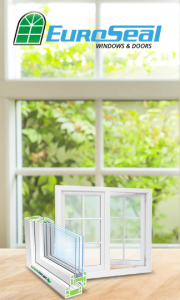CALL US: 416-650-5070
Menu
CALL US: 416-650-5070
CALL US: 416-650-5070
When it comes to window manufacturing materials, most people immediately think of popular and well-known materials like glass, wood, and PVC. However, here at Euroseal, we’re always looking for ways to think outside of the box. While these traditional materials have decades of history and proven track records, emerging window manufacturing materials offer a ton of benefits that many people don’t know about.
As window manufacturers in the GTA, we’re always looking for ways to enhance the aesthetic, efficiency, and security of our clients’ homes through window installation. One of the best ways to do that is to look at innovative new materials that are revolutionizing how we think about window installation and replacement.
Below, we’ve looked at window manufacturing materials, from the traditional to the new and innovative, to give you a sense of how the world of window installation is changing and what the benefits could be. Learn more below.

There are many types of window materials that have been used for decades to build sturdy and practical windows. But while the materials can provide some protection from the elements, many of them have limitations.
Wooden frames have a long history in window installation and are still used today. They can be relatively expensive and require lots of maintenance. You can usually find both soft and hardwood options.
Limitations of wood in window manufacturing include:
Usually used to create very sleek and clean window frames, aluminum is often used for casement windows. Though they look shiny and expensive when installed, aluminum windows are not impervious to oxidation. Other limitations of aluminum include:
Also known as vinyl windows, this is probably the most common frame material you will find. It does make for a good choice when it comes to replacement windows and is used in a variety of ways, including for front doors, patio doors, and various window styles.
Vinyl windows are durable and energy efficient, but they do have some limitations. These include the following.
It is rare these days to find window companies in Toronto installing single-pane glass windows, and that is because of the variety of limitations they have.
These kinds of windows are installed to control the UV light coming in through your windows. However, they have a few limitations that may outweigh the benefits for some people.
Clear glass probably seems like an obvious choice for windows, but again, there are some limitations to this material in window manufacturing. These include:
Argon gas-filled windows are thought to provide better insulation than air-filled double glazing, but they, too, have some limitations.
While serving up a list of limitations may make it seem like aluminum or vinyl windows, for example, are not good choices, these limitations are just within the context of advancement within the industry. Many window replacement companies still work with these materials and install high-quality, secure, and efficient windows across the GTA.
Two key areas where window manufacturing is developing include smart technology and energy efficiency, and sustainable window manufacturing. These developments help to reduce costs for homeowners and to reduce further damage to the plant.
We’ve gone into detail about each of these areas to help you understand what kind of materials have been developed.
Smart window technology is designed to help reduce energy bill costs and improve energy efficiency for homeowners. Smart glass window technology, also known as switchable or dynamic windows, can control the amount of light, heat, and glare that enters a building. They can be controlled electronically to adjust properties like transparency and insulation.
There are a few different kinds of smart windows. These include the following.
These windows may be controlled by a person manually, set to preferences by the user, or work without support, depending on the kind you use. There are many other types of smart windows that can be used for a range of needs. The ultimate aim is to enhance the overall efficiency of your home and reduce costs.
Sustainability and eco-friendly options are close to our heart at Euroseal. As with many, many industries, the window and door manufacturing industry requires change to be more sustainable and to reduce its carbon footprint. Below are a few of the most sustainable window manufacturing materials you can find on the market today.
Wood is a renewable and natural resource. However, poor farming and felling practices can lead to deforestation, loss of habitats, and the rise of carbon in the atmosphere. Using certified sustainable wood, like FSC-certified wood, is a sustainable choice for window frames.
Fiberglass has a much longer lifespan than other materials used in window production, meaning it won’t need to be replaced and disposed of as often. Additionally, they offer impressive energy efficiency, helping to heat and cool houses quickly. It is also made from an abundant and recyclable material.
Composite materials refer to materials made with a combination of wood fibres, recycled plastics, and other sustainable components. With durable plastic and the aesthetics of wood, composite window frames are highly desirable. They help make the industry more circular and are very durable.
When getting your windows replaced, it is essential to consider the long-term benefits of the windows you want. Will they help reduce energy costs and keep the home warm and cool? Will they require lots of maintenance? Are they durable?
While there are many advancements in window materials, PVC, aluminum, and wood are all still used today, and you can find sustainable options for each.
If you’re looking to improve the energy efficiency of your home, then contact Euroseal today. We’re window installation experts with decades of experience, and we’re ready to help.

© 2025 Euroseal Window Industries Ltd. All Rights Reserved.
Read more